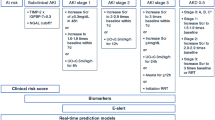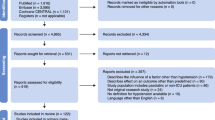Abstract
Background Hyponatremia has been known as an important predictor of clinical outcomes in patients with heart failure (HF). While information on hyponatremia in patients with HF has been available abundantly, information on factors associated with increased risk of developing hospital-acquired hyponatremia (HAH) is still limited. Objective To identify patients and medication-related factors associated with HAH in patients hospitalized from HF. Setting Fatmawati Hospital in Jakarta, Indonesia. Methods This is a nested case–control study with patients developing HAH served as case group and each patient in case group was matched by age and gender to three patients in control group. Patients included in this study are patients hospitalized from HF, and coded with I.50 according to ICD-10, during 2011–2013 at Fatmawati Hospital in Jakarta, Indonesia. Information retrieved from patients’ medical records included demographic profiles, vital signs and symptoms at admission, past medical history, medication during hospitalization and clinical chemistry laboratory records. Multivariable logistic regression analysis was performed to find out patient and treatment-related factors associated with the development of HAH. Main outcome measures Patients and medication related factors having significant association with HAH. Results Four hundreds sixty-four patients were included in this study and 45 of them (9.7 %) met criteria of developing HAH so then, accordingly, 135 patients were selected as controls. 36 patient- and 22 treatment-related factors were analyzed in univariate logistic regression resulted in 20 factors having p value <0.2 and were included in multivariable logistic regression analysis. Final factors showing significant association with HAH are presence of ascites at admission (odds ratio = 4.7; 95 % confidence interval 1.9–11.5) and administration of amiodarone (3.2; 1.3–7.4) and heparin (3.1; 1.2–7.3) during hospital stay. Conclusion Presence of ascites at admission was found as patient-related factors associated with HAH in this study. In addition, administration of amiodarone and heparin during hospital stay were found as medication-related factors associated with HAH in patients hospitalized from HF.

Similar content being viewed by others
References
Sato N, Gheorghiade M, Kajimoto K, Munakata R, Minami Y, Mizuno M, Aokage T, Asai K, Sakata Y, Yumino D, et al. Hyponatremia and in-hospital mortality in patients admitted for heart failure (from the ATTEND registry). Am J Cardiol. 2013;111(7):1019–25.
Saepudin S, Ball PA, Morrissey H. Hyponatremia during hospitalization and in-hospital mortality in patients hospitalized from heart failure. BMC Cardiovasc Disord. 2015;15:88.
Hauptman PJ. Clinical challenge of hyponatremia in heart failure. J Hosp Med. 2012;7(Suppl 4):S6–10.
Kearney MT, Fox KAA, Lee AJ, Prescott RJ, Shah AM, Batin PD, Baig W, Lindsay S, Callahan TS, Shell WE, et al. Predicting death due to progressive heart failure in patients with mild-to-moderate chronic heart failure. J Am Coll Cardiol. 2002;40(10):1801–8.
Romanovsky A, Bagshaw S, Rosner MH. Hyponatremia and congestive heart failure: a marker of increased mortality and a target of therapy. Int J Nephrol. 2011;. doi:10.4061/2011/732746.
Allen LA, Gheorghiade M, Reid KJ, Dunlay SM, Chan PS, Hauptman PJ, Zannad F, Konstam MA, Spertus JA. Identifying patients hospitalized with heart failure at risk for unfavorable future quality of life. Circ Cardiovasc Qual Outcomes. 2011;4(4):389–98.
Hoorn EJ, Lindemans J, Zietse R. Development of severe hyponatraemia in hospitalized patients: treatment-related risk factors and inadequate management. Nephrol Dial Transplant. 2006;21(1):70–6.
Thompson C, Hoorn EJ. 1 Hyponatraemia: an overview of frequency, clinical presentation and complications. Best Pract Res Clin Endocrinol Metab. 2012;26:S1–6.
Bettari L, Fiuzat M, Shaw LK, Wojdyla DM, Metra M, Felker GM, O’Connor CM. Hyponatremia and long-term outcomes in chronic heart failure—an observational study from the Duke Databank for Cardiovascular Diseases. J Card Fail. 2012;18(1):74–81.
Essebag V, Genest J, Suissa S, Pilote L. The nested case–control in cardiology. Am Heart J. 2003;146(4):581–90.
Biesheuvel CJ, Vergouwe Y, Oudega R, Hoes A, Grobbee DE, Moons KG. Advantages of the nested case–control design in diagnostic research. BMC Med Res Methodol. 2008;8(48):1–7.
Beukhof CM, Hoorn EJ, Lindemans J, Zietse R. Novel risk factors for hospital-acquired hyponatremia: a matched case–control study. Clin Endocrinol (Oxf). 2007;66(3):367–72.
Wald R, Jaber BL, Price LL, Upadhyay A, Madias NE. Impact of hospital-associated hyponatremia on selected outcomes. Arch Intern Med. 2010;170(3):294–302.
Shchekochikhin DY, Schrier RW, Lindenfeld J, Price LL, Jaber BL, Madias NE. Outcome differences in community- versus hospital-acquired hyponatremia in patients with a diagnosis of heart failure. Circ Heart Fail. 2013;6(3):379–86.
Yancy CW, Jessup M, Bozkurt B, Masoudi FA, Butler J, McBride PE, Casey DE Jr, McMurray JJ, Drazner MH, Mitchell JE, et al. 2013 ACCF/AHA guideline for the management of heart failure: a report of the American College of Cardiology Foundation/American Heart Association Task Force on Practice Guidelines. J Am Coll Cardiol. 2013;62(16):e147–239.
Rai A, Whaley-Connell A, McFarlane S, Sowers JR. Hyponatremia, arginine vasopressin dysregulation, and vasopressin receptor antagonism. Am J Nephrol. 2006;26(6):579–89.
Ghali JK, Tam SW. The critical link of hypervolemia and hyponatremia in heart failure and the potential role of arginine vasopressin antagonists. J Card Fail. 2010;16(5):419–31.
Doggrell SA. Amiodarone-waxed and waned and waxed again. Expert Opin Pharmacother. 2001;2(11):1877–90.
McMurray JJ, Adamopoulos S, Anker SD, Auricchio A, Bohm M, Dickstein K, Falk V, Filippatos G, Fonseca C, Gomez-Sanchez MA, et al. ESC guidelines for the diagnosis and treatment of acute and chronic heart failure 2012: the Task Force for the Diagnosis and Treatment of Acute and Chronic Heart Failure 2012 of the European Society of Cardiology. Developed in collaboration with the Heart Failure Association (HFA) of the ESC. Eur J Heart Fail. 2012;14(8):803–69.
Dutta P, Parthan G, Aggarwal A, Kumar S, Kakkar N, Bhansali A, Rotondo F, Kovacs K. Amiodarone induced hyponatremia masquerading as syndrome of inappropriate antidiuretic hormone secretion by anaplastic carcinoma of prostate. Case Rep Urol. 2014;2014:136984. doi:10.1155/2014/136984.
Pham L, Shaer AJ, Marnejon T. Hyponatremia—a rare but serious complication of amiodarone: a case report and review of the literature. Case Rep Nephrol Urol. 2013;3(1):46–50.
Ikagemi H, Shiga T, Tsushima T, Nirei T, Kasanuki H. Syndrome of inappropriate antidiuretic hormone secretion (SIADH) induced by amiodarone: a report on two cases. J Cardiovasc Pharmacol Ther. 2002;7(1):25–8.
Oster JR, Singer I, Fishman LM. Heparin-induced aldosterone suppression and hyperkalemia. Am J Med. 1995;98:575–86.
Bengalorkar GM, Sarala N, Venkatrathnamma PN, Kumar TN. Effect of heparin and low-molecular weight heparin on serum potassium and sodium levels. J Pharmacol Pharmacother. 2011;2(4):266–9.
Norman NE, Sneed AM, Brown C, Ellis CA, Minard G, Brown RO. Heparin-induced hyponatremia. Ann Pharmacother. 2004;38(3):404–7.
Greenberg A, Verbalis JG, Amin AN, Burst VR, Chiodo Iii JA, Chiong JR, Dasta JF, Friend KE, Hauptman PJ, Peri A, et al. Current treatment practice and outcomes. Report of the hyponatremia registry. Kidney Int. 2015;88(1):167–77.
Nemerovski C, Hutchinson DJ. Treatment of hypervolemic or euvolemic hyponatremia associated with heart failure, cirrhosis, or the syndrome of inappropriate antidiuretic hormone with tolvaptan: a clinical review. Clin Ther. 2010;32(6):1015–32.
Verbalis JG, Goldsmith SR, Greenberg A, Schrier RW, Sterns RH. Hyponatremia treatment guidelines 2007: expert panel recommendations. Am J Med. 2007;120(11 Suppl 1):S1–21.
Sterns RH, Nigwekar SU, Hix JK. The treatment of hyponatremia. Semin Nephrol. 2009;29(3):282–99.
Acknowledgments
The authors would like to thank Directorate of Higher Degree Education, Ministry of Education Republic of Indonesia, for Ph.D. scholarship supporting this study.
Funding
None.
Conflicts of interest
Nothing needs to be declared.
Author information
Authors and Affiliations
Corresponding author
Rights and permissions
About this article
Cite this article
Saepudin, S., Ball, P.A. & Morrissey, H. Patient and medication-related factors associated with hospital-acquired hyponatremia in patients hospitalized from heart failure. Int J Clin Pharm 38, 848–854 (2016). https://doi.org/10.1007/s11096-016-0296-3
Received:
Accepted:
Published:
Issue Date:
DOI: https://doi.org/10.1007/s11096-016-0296-3




